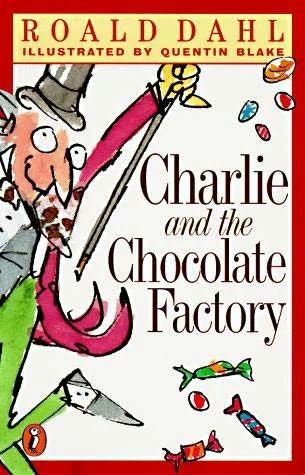 |
| Alfred A. Knopf |
Having finished Charlie and the Chocolate Factory (and realized there were indeed no fatalities recorded), I feel confident saying I enjoyed Roald Dahl's novel. I don't believe I'll change my mind about Willy Wonka. He's still wickedly brilliant and he's incredibly devious, more so than I ever thought possible; moreover, he's attempting to groom a successor to run his chocolate factory, which I find rather unnerving if I really think about it.
But, regardless, Charlie and the Chocolate Factory has a happy ending. The terrible children who disobeyed the rules and disregarded all parental authority suffered the consequences for their actions; Willy Wonka found a successor to ensure his factory would remain intact and safe; Charlie Bucket and his family are given a new home and they will no longer starve.
All's well that ends well, right?
By the conclusion of the book, I can't help being happy for Charlie Bucket. As it turns out, Willy Wonka is harmless (more or less) and he's kind enough to leave Charlie a lasting legacy, giving the boy a brand new life: Charlie will never go hungry again! I realize that must be an incredible thing for a little boy who has only ever known poverty, uncertainty, and hunger.
And it seems incredibly important that Charlie and the Chocolate Factory ends with Charlie reassuring his family that their fortune has changed, that they will no longer starve. It essentially brings the story full circle, taking it back to the issue of hunger under rather more auspicious circumstances.
Additionally, I've realized that Willy Wonka is only looking out for the best interests of his factory and his Oompa-Loompas. If he is unforgiving of the other children who either disregard his authority or ignore his warnings, I suppose he has the right. I mean, I understand why he doesn't feel the slightest bit of remorse for Veruca Salt being thrown down the garbage chute. I never liked Veruca much either, so it's almost a relief when she gets her just desserts for her disobedience and petulant attitude. Same with Mike Teavee: you're glad to see him gone.
However, I still find the Oompa-Loompas songs rather disturbing. That has certainly not changed with further reading. Even if I don't much care for Veruca Salt or Mike Teavee, I do feel a little bad for their plight. Veruca is just a spoiled child, she doesn't deserve to reach the incinerator; Mike Teavee is disobedient and arrogant, he doesn't deserve to spend the rest of his life as the size of an ant. The Oompa-Loompas would disagree:
"P.S. Regarding Mike Teavee,
We very much regret that we
Shall simply have to wait and see
If we can get him back his height,
But if we can't - it serves him right."
Yes, I suppose it serves him right, but I might still feel a twinge from my conscience.
No comments:
Post a Comment